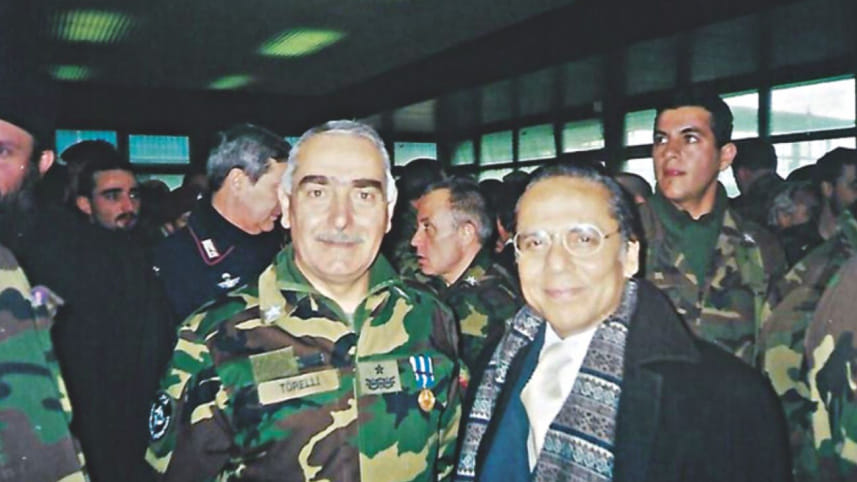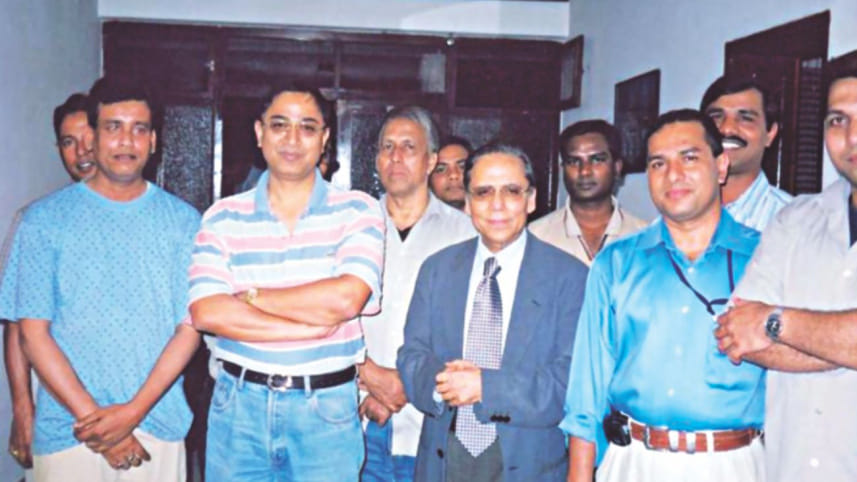UN Mission in Kosovo (UNMIK): Recollection of some personal experiences

The UNMIK in Kosovo was one with a difference. The peacekeepers from the military called the Kosovo Force (KFOR) were almost entirely drawn from the permanent member countries of the UN Security Council and the EU. Bangladesh and other developing countries did not have any participation in the KFOR. However, there were Bangladeshi peacekeepers from the Bangladesh Police force. I can recall the name of some of the Bangladeshi police officers including present DG, RAB Forces Benazir Ahmed, Former IG Nur Mohammad, Additional IG Jabed Patwary, Additional DIG Selim Jahangir and others. They served with distinction and made significant contribution towards conflict resolution and peace in Kosovo.
Before detailing some of my personal experience of the UN Mission in Kosovo (UNMIK), I would touch briefly on my experience as a diplomat in the former Yugoslavia.This should be useful for a better understanding and appreciation of UNMIK role in Kosovo.
I was given the honor to open the first Bangladesh Mission in Belgrade, former Republic of Yugoslavia in May 1972. It was a historic moment when the Bangladesh flag was unfurled at our modest house in Dadijnija, in the diplomatic suburb of Belgrade.
Former Republic of Yugoslavia (FRY) under President Josip Broz Tito was a model of peace, stability, religious and ethnic tolerance including peaceful coexistence of all communities of Yugoslavia. Comprising of six republics and two autonomous provinces, it was remarkable that no one ever mentioned his or her ethnicity or religion. The people were proud to be Yugoslavs and saw their country as an embodiment of the best in which the rich legacies of different ethnicity and religions blended harmoniously to forge a strong Yugoslav Federation. That one of the worst forms of religious and ethnic cleansing and conflict in the Balkans could be ignited by Milosovic,successor of Tito, leading to the disintegration of the FRY was beyond one's comprehension, not to speak of the magnitude of the tragedy and genocide fueled by the misuse of religion for achieving political ambition and aggrandizement. This is a lesson which people and nations around the globe can forget only at their own peril.
When I joined the United Nations Mission in Kosovo (UNMIK), I was driven by a UN vehicle from Pristina, the capital of Kosovo to the Pec/Peja region to take up my first assignment as a Municipal Administrator. As I meandered from the city through the villages I could not hold my tears to see houses still in flame and mass graveyards. I had served in many capitals of the world as a diplomat but nothing prepared me for the shock to see the scale of humanitarian toll, including death and destruction that lay in front of my eyes. Is this the price of conflict the innocent civilians predominately children, women and the aged have to pay for the ambition, greed and aggrandizement of one or a few? Perhaps never in the history of human conflict was so much suffering inflicted on so many by so few, including taking into account the genocide in Bosnia. I thought to myself I had seen the same place and the people during the peace time in the FRY working tirelessly during the day and enjoying somewhat wildly at night, apparently a Balkan way of life: eating, drinking, singing and dancing to the folk songs and tunes which Yugoslavs were fond of; no one knew or could know at that time as to who was a Serb, Albanian, Croat or Bosnian; Muslim, Christian, Jews, agnostic or atheist. What mattered was their happiness knit together in a bond of neighborly friendship and affection: 'DobroPriyateel' (great friends) as they would greet one another.
'What has gone wrong with you?Why do you hate each other so much?,' I asked local Muslim Albanians and orthodox Christian Serbs at a multi-ethnic meeting in a village. I reminded them, “ You are the same people I knew living peacefully before the conflict and now you are interlocked in bitter conflict and hatred?” I told them of my serious disappointment and frustration. “We did not start the conflict; we are the same people and wish to live together; conflict is the agenda of the politicians,” they replied in unison. This was and is the ground reality of Kosovo. The local Serbs and Albanians wish to live together but Belgrade supported by the extremists and mafias wanted the conflict to continue to serve their design; the voice of the locals who are the silent majority got drowned in the welter of propaganda unleashed by the radicals, who continue to foment unrest in Kosovo through a handful of extremists paid by them; they magnify and orchestrate violence to portray a divided Kosovo, to deny the genuine aspiration of Kosovans for freedom and independence; the radicals and mafias wanted partition of Kosovo along religious and ethnic lines. The overwhelming majority of Kosovo Albanians and Kosovo Serbs wish to live together as a democratic multi-religious/multi-ethnic tolerant Kosovo.

While driving through Pristina, I saw a huge statue of President Bill Clinton. I asked my Albanian driver about it. He said it was 'Besa' which is something close to gratitude but in local Albanian parlance it meant much more; they are grateful to Clinton and the USA for the humanitarian intervention in Kosovo following mass ethnic and religions cleansing of Kosovo Albanians by Milosovic and his Army at a time when most of the European leaders were dithering. While I have my reservation on blanket military interventions I feel that President Clinton and the US deserve credit for saving countless millions of civilians, particularly the Muslims and the Croats from certain ethnic/religious cleansing following the genocide through humanitarian, military intervention. Otherwise Kosovo would have been worse than the killing field of Srebrenica.
My nearly five years stay in Kosovo is filled with memories of many eventful incidents. Due to constraint of space and time I will confine myself to narration of only a few of them.
Soon after I joined the UNMIK I was told by Deputy Special Representative of the Secretary General (DSRSG) Tom Koening that he and SRSG Bernard Kuchner felt that I should immediately take control of the 'militant' municipality of Decan/Decani in the Peja/Pec region and one of the main strongholds of the Kosovo Liberation Army (KLA) and home of Ramush Hrdinje, a brave freedom fighter of Kosovo. There was conflict brewing between the Monks of the Serbs Orthodox Decani Monastery and the Muslim Kosovo Albanians led by Ramush and the municipal president, Bokaje. I was told to defuse the situation through mediation between the Monks and the Albanian leadership. I was given the impression that this was some sort of clash of civilizations between the Muslims and the Christians at the grass roots and if not handled adroitly could lead to a larger conflict involving the Kosovo Serbs and the Kosovo Albanians in the rest of Kosovo with its consequent negative fallout on UN mandate in Kosovo. Incidentally, the Decani Monastery is one of the finest historic treasures, built around the fourteenth century. It is also one of the largest monasteries with its own vineyard, fresh spring water and rare piece of architectural beauty.

In my long series of meetings involving a cross section of K.Albanian Muslim leadership from the village council level to the municipal president and Ramush Hardinje, I found out that the dispute had nothing to do with religion; it was economic. During the time of Milosovic he had given additional lands belonging to the Kosovo Albanians, which included a honey factory and a hotel adjacent to the monastery. Instead of revoking this illegal gift of land, the UN Administration after the conflict legalized the gift of land to the monastery. The Decan/Decani municipality was one of the poorest municipalities in Kosovo and its people were rendered poorer due to the war. Against this background of mounting economic hardship and unemployment, the issue of land with honey factory and hotel became a major bone of contention between the Kosovo Albanians and the Monks with the potential for outbreak of open conflict between Kosovo Albanian and Kosovo Serbs.
After intensive negotiations, I was able to persuade the K.Albanian Muslim leadership and the Serb Orthodox Christian Monks to have a face-to-face meeting at the Italian Kosovo Force (KFOR) base in Decan/Decani. I found Father Sava, who was leading the negotiation on behalf of the Monks, a suave and astute person more in the mould of a diplomat than a religious leader. He spoke English fluently and had a good grasp of the international situation. The negotiations at the Italian base were long and protracted but eventually paved the way for an amicable solution which recognized the legitimate interest of both the parties.
I was then moved to Skendergi/ Srbica in the Mitrovica region of Kosovo. This was even more of a militant municipality and bastion of the KLA's legendary hero Adam Jeshari whose brutal killing along with his family members by the Serbian forces provided the immediate spark for the outbreak of conflict of Kosovo. The successful handling of this municipality, acknowledged as the most dangerous and difficult one, led to my transfer to the Regional Headquarters of the Mitrovica Region first as the Deputy and subsequently as Regional Administrator. This was the most challenging assignment as Mitrovica was the main flash-point of the conflict from where the war of Kosovo began.

In my capacity as the UN Regional Administrator of Kosovo, the first diplomat from a developing country to hold the post, I was fortunate to be able to make my modest contribution to the process of peaceful resolution of the Kosovo crisis. As the Regional Administrator of Mitrovica, I sustained the process of direct negotiations initiated by my predecessor David Mitchels involving the elected presidents of three Albanian municipalities in the south of Mitrovica region and three presidents of the Serbian municipalities in the north of Mitrovica. Mitrovica was characterized by a de facto partition between the Kosovo Albanians in the South and the Kosovo Serbians in the North separated by the river Ibar and connected by a bridge on the river. The painstaking negotiations took place in the UN Regional headquarters in Mitrovica and lasted for months.
I was ably assisted by the French KFOR General, the Irish police commander and the UNMIK Municipal Administrators of the region, among others. The fact that the two antagonistic parties involving local elected Albanian and Serbian leaders had begun to talk among themselves with the UN Regional Administrator acting as an honest broker was by itself a diplomatic success considering that there was no direct communication between them after the bloody conflict.
The historic process of building a democratic, multi-religious and multi-cultural Kosovo is ongoing. Its success is crucial to building of democratic multi-cultural, multi-religious societies in other states of former Yugoslavia, particularly in Serbia dominated by the rise of the radicals and haunted by the ghost of Melosovic. The international community's support to the process of ensuring peace and stability in the Balkans is essential for achieving global peace and for success in the fight against the menace of terrorism, militancy and extremism afflicting the world at large.
The lesson learnt from UN experience in Kosovo is that there is no durable military solution to essentially political, religious, sectarian and ethnic conflicts. It is time forthe world to opt for patient negotiations and diplomacy. The outcome achieved through such peaceful means is generally more lasting as violence, conflicts and wars create perpetual hatred in the hearts and minds of the people. It is said, 'If war begins in the hearts and minds of the people, it is in their hearts that defenses of peace should be built'.
The writer is former UN Regional Administrator in Kosovo and former Bangladesh Ambassador to Japan.



 For all latest news, follow The Daily Star's Google News channel.
For all latest news, follow The Daily Star's Google News channel.
Comments